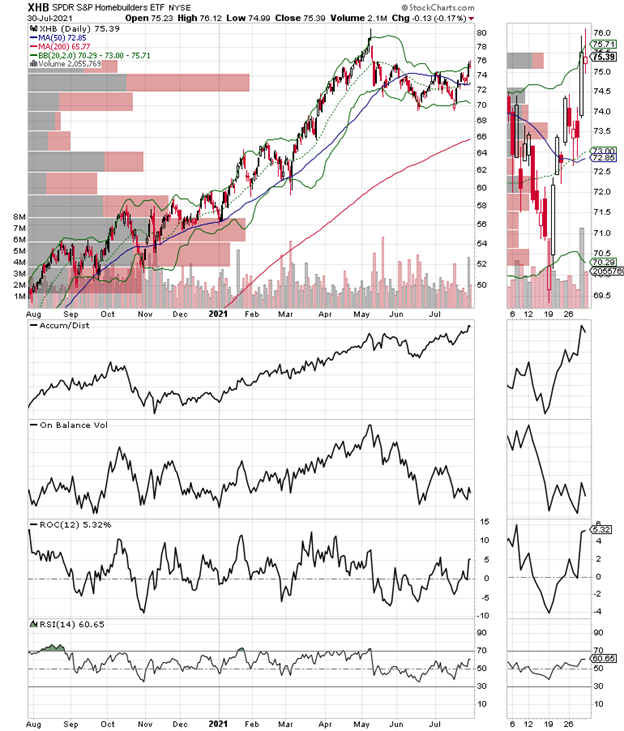Despite some sloppy trading action and some sluggishness in the market’s breadth, there may be some good news developing in the options market, which could bode well for stocks in the not-too-distant future, barring some sort of unpleasant surprise, says Joe Duarte of In the Money Options.
Of course, at the end of the day, the most influential variable is what the Federal Reserve does to its QE protocol. And for now, until proven otherwise, the Fed is not likely to stop, or likely reduce QE. This is especially true after the negative effect on the stock market that the central bank’s quiet reverse repo (RRP) operations and a weakening of recent economic data (less than expected GDP growth, fading consumer confidence, falling home sales, and COVID uncertainty) are having.
Certainly, we don’t want to get into the weird and wacky world of central banking. But here are the basics of the repo operations. The Fed sells banks and financial institutions bonds for a short period of time. During that time, the Fed pays a higher interest rate to the buyers than they are getting in the markets. Then the Fed buys the bonds back at a guaranteed price. So, the banks are getting a guaranteed amount of money that beats the market rates, which means institutions are more than glad to take the Fed’s offer. The net effect, unfortunately, is that when institutions do RRP transactions with the Fed, it takes potential stock-buying money out of the system, which is why the market is so wishy washy lately.
Of course, a trader’s job is to sort through the noise and to develop winning strategies. And what’s working best at the moment is trading smaller lots than usual of stocks, using options for risk management, considering stocks in beaten-down sectors, and shortening time frames for trades. See the next section, below, for more on a beaten-down sector, which is worth looking at in the current market.
Have Lumber and Homebuilder Stocks Bottomed Out?
Bull markets are built on a simple principle: the presence of high demand during periods of low supply. And, regardless of recent home sales data, the fundamentals of the housing market are as bullish as ever. Thus, it is possible that we could be in one of those moments where bearish sentiment may be signaling an important buying opportunity.
As I discussed in my recent Your Daily Five video, referenced above, the lumber sector and parts of the housing market seem to be clawing for a tradeable bottom. In the video I discuss some trading strategies, which could prove useful as the market makes a decision on this important and related sector duo. In this section, I am more focused on whether there is confirmation of the potential bottom in lumber from its main customer base, homebuilders.

So first, let’s look at the Homebuilder ETF (XHB), where we see a potential short-term breakout developing. Specifically, the ETF has been consolidating of late. Moreover, if the $72 price area holds, and XHB moves above $76, we could well see a move back to the $80 area and possibly a breakout beyond that.

This potentially bullish development is being confirmed by a similar bottom in the lumber stocks, such as Louisiana Pacific (LPX). Certainly, LPX still has a fair amount of work to do with important resistance looming at the 50-day moving average. In addition, a move above 50 for RSI would confirm the odds of a move higher. Nevertheless, the odds are that barring a major negative economic development, we’ve seen the bottom in LPX.

Perhaps the tiebreaking vote in whether the homebuilder-lumber complex can deliver a strong enough turnaround to make me turn all out bullish is what happens in the bond market where the US Ten-Year Note yield (TNX) looks to be testing its own important resistance at the 200-day moving average.
Moreover, I had a conversation with a local builder, a couple of days ago, who confirmed the fact that his costs have risen dramatically due to materials, especially lumber and drywall. He also said that wholesalers are still not passing on the recent declines in the lumber futures markets as they have to work through the inventory, which they purchased at the previous record prices.
At the same time, however, his take is that demand remains excellent, especially for new homes while pricing is becoming a factor for some but not all buyers. Finally, he says that similar model homes he was selling eight months ago for $350,000 will now be listed above $400,00 as he has to recoup his costs. The bottom line, he says, is that some buyers are no longer able to participate in this market, but he has not seen a drop in demand.
SPY Options Increase Moderately Bullish Stance
Something interesting is happening in the options market which may bode well for the stock market. Traders are loading up on call options at the 439 and 440 strike prices for S&P 500 SPDR (SPY). Meanwhile, traders are loading up on put options at 438, but even at 438 toward the end of trading on the weekly expiration on 7/30/21, the number of call options bought was rising.
This is important because the 438-440 price area is an important swing level for SPY. Moreover, if this ETF can move back above this key price area convincingly, it will mean that the S&P 500 will have led the way higher.
This is the type of action that often precedes a turning point in the market. We will have to see if it pans out.
Republic Services Delivers Breakout Quarter for Patient Investors
Shares of waste management company Republic Services (RSG) delivered a major price breakout on 7/30/21 after a blowout quarterly report.

I recommended RSG in March 2021, when it broke out above $96 and have stuck with it for the past few months. And so far, it’s been worth it. The stock is certainly in the profit-taking zone having climbed well above 20% since purchase. Nevertheless, its breakout is worth analyzing since it’s based on a blockbuster earnings report.
The highlights are a 36% year-over-year growth in earnings with over a billion dollars in free cash flow. Moreover, the company continues to grow via acquisitions as well as by increasing its market share. But perhaps what’s most interesting is the fact that it has been able to raise prices in the midst of a pandemic and that management has now upgraded its full-year guidance.
This one metric suggests that the economy, especially areas such as restaurants and construction projects which generate large volumes of waste are busy. And this will be worth watching over the next few weeks to months.
Technically, the stock remains strong with Accumulation Distribution (ADI) and On-Balance Volume (OBV) making new highs and confirming the new price highs. It would not be unusual to see some price consolidation at these levels. But the company’s stock buyback program is likely to keep the stock from falling rapidly.
I own shares in RSG at the moment.
Market Breadth Remains Caught in Trading Range
New highs in the major indexes without confirmation from the New York Stock Exchange Advance Decline line (NYAD) continue and this divergence can lead to serious market declines. As a result, it’s a good idea to remain cautious, but not bearish in this market.
For now, the market gets the benefit of the doubt. But it is a somewhat soft benefit, as the longer the indexes make new highs without confirmation, the more likely will be the odds of a decline.

Moreover, if NYAD fails, at the very least, to remain above its 50-day moving average without RSI climbing back above 50, things could get very interesting.

Both the Nasdaq 100 (NDX) and the S&P 500 (SPX) indexes rolled over to end the week after both made new highs previously.

With market breadth softening, I expect a continuation of the current market actively.
To learn more about Joe Duarte, please visit JoeDuarteintheMoneyOptions.com.











